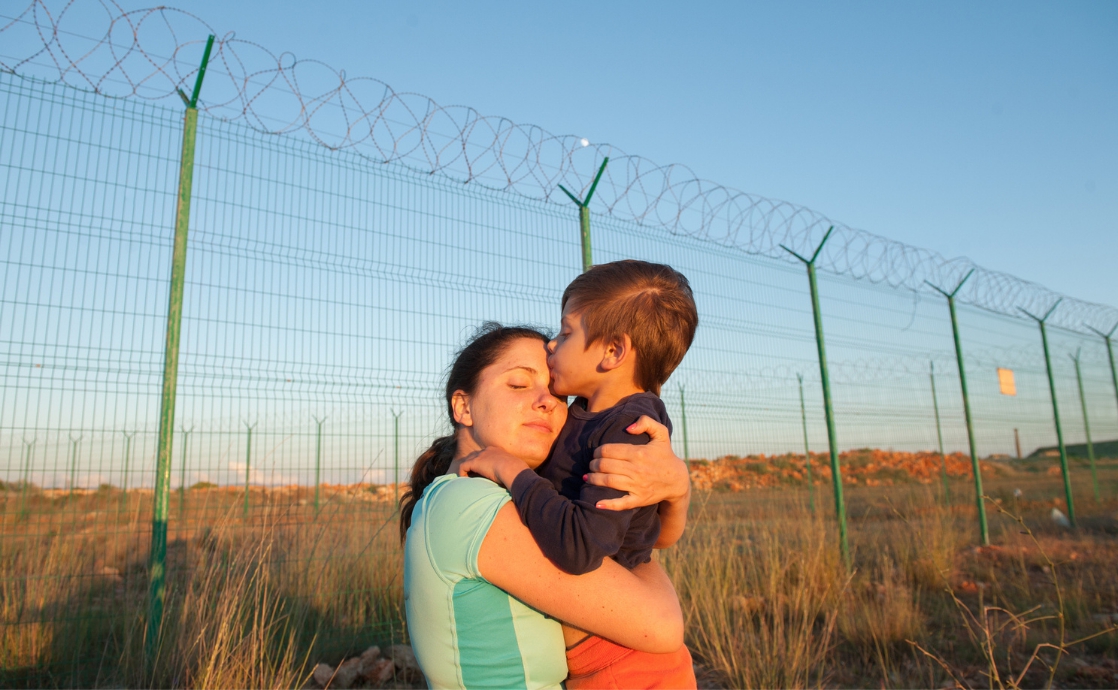The views expressed in our content reflect individual perspectives and do not represent the authoritative views of the Baha'i Faith.
It seems like every country on Earth now faces some kind of refugee or migration emergency. The recent crush of Haitian refugees attempting to enter the United States in Texas shows us all a dire example.
So as we consider what to do about our twin global migration and refugee crises, let’s review the moral and religious guidance we’ve received from the great Faiths to orient ourselves to a higher and more spiritual point of view.
RELATED: Refugees: A New Parable of the Good Samaritan
We can begin by heeding the wise advice of Judaism, from Leviticus 19 in the Old Testament:
When a foreigner resides among you in your land, do not mistreat them. The foreigner residing among you must be treated as your native-born. Love them as yourself, for you were foreigners in Egypt.
In the Book of Mathew in the New Testament, Jesus gave his followers this loving counsel:
For I was hungry and you gave me something to eat, I was thirsty and you gave me something to drink, I was a stranger and you invited me in, I needed clothes and you clothed me, I was sick and you looked after me, I was in prison and you came to visit me.
In the Qur’an, Muhammad kindly advised:
They love those who emigrated to them and find not any desire in their hearts of what the emigrants were given, but rather give them preference over themselves, even though they are in privation.
The Baha’i teachings ask all human beings to help those who need our help:
Be very kind and serve every one; become lovers of justice and pray for the whole of mankind; help the poor and the children; heal the sick; shelter the refugees; and be known by your lives as the children of God; so may that sun become the light of the world, casting its radiance upon East and West.
Keeping this consistent spiritual guidance in mind, ask yourself two questions: where do I come from? Did my ancestors always live where I live now?
We Are All Migrants
It might surprise you to learn that very few people alive today can claim to be indigenous to the land where they currently live. Globally, genealogists estimate that 99 per cent of the world’s people have migrated away from their “original” ancestral homeland. So unless you live in the Horn of Africa near the Great Rift Valley, where human life as we know it began, your family definitely migrated at some point in its history. With the possible exception of a few thousand Africans in modern-day Djibouti, Eritrea, Somalia, and Ethiopia, everyone’s ancestors left their place of birth to go somewhere else.
That basic scientific fact makes us all migrants.
You may think of yourself now as a Brazilian, a German, an American, a Salvadoran or an Ethiopian, but your ancestors probably didn’t. National identities have only existed for a few hundred years in most places, anyway; and if you know anything at all about your genealogy, you know that your ancestral predecessors likely came from or lived someplace else.
Because our ancestors repeatedly moved from one place to another, and then another, and then another, the history of humanity tells the story of continual migration. We’ve always traveled to other places for food, for shelter, for work and for a safe place to raise our children. So historically, migration describes the normal human condition, not an exception to the rule – because we all descended from nomadic tribal people at some point in our ancestry.
Have you had your DNA analyzed? If so, you already understand this reality, because all living people on Earth today have a diverse biological ancestry that includes many different geographic and ethnic strains. No one has only one racial, ethnic, regional, or ancestral heritage.
Which means, according to the Baha’i teachings, that we are all equal citizens of one indivisible world. We all reside on one planet.
RELATED: Were the Prophets Refugees and Migrants?

How the Baha’i Teachings Address the Migrant and Refugee Crisis
Because every human being belongs to the wider human family, Baha’u’llah, the founder and prophet of the Baha’i Faith, urged everyone to love one another and consider all people as fellow world citizens:
It is not for him to pride himself who loveth his own country, but rather for him who loveth the whole world. The earth is but one country, and mankind its citizens.
This remarkable, revolutionary concept of transnational global citizenship represents the core social principle of the Baha’i Faith, and the ultimate solution to our shared immigration and refugee issues.
World citizenship has implications for the entire political structure of the planet’s governments and societies. Challenging old, outworn notions about nationality, citizenship, patriotism and love of country, it calls for the complete remaking of the prevailing political order of sovereign nations, asking every human being to reconsider their “national” identity, subordinate their love of country, and replace it with a wider and more inclusive love and loyalty for all humanity — and for the Earth itself:
May you all be united, may you be agreed, may you serve the solidarity of mankind. May you be well-wishers of all humanity. May you be assistants of every poor one. May you be nurses for the sick. May you be sources of comfort to the broken in heart. May you be a refuge for the wanderer. May you be a source of courage to the affrighted one. Thus, through the favor and assistance of God may the standard of the happiness of humanity be held aloft in the center of the world and the ensign of universal agreement be unfurled.
Once adopted and put into practice, world unity and the consciousness of global citizenship can end the terrible injustices that occur solely because of your place of birth. They will terminate the tyranny of national borders; will allow the free movement of all people across the planet; will help halt the humanitarian refugee and migrant crises and disasters we now face; will offer humanity its first true collective opportunity to effectively deal with the entire Earth’s pressing environmental issues; will increasingly bring the populations of all regions into peaceful and mutually helpful contact with each other; and most importantly, will make it impossible for any one nation to impose its will on others by unilaterally declaring and waging war.
But the Baha’i teachings go farther than just promoting a parliament of nations and a growing sense of world citizenship – they also call for economic justice for all people.
In a speech to the United Nations General Assembly in September, after more than 10,000 Haitian migrants crossed into Del Rio, Texas from South America, Haitian Prime Minister Ariel Henry reminded the world that global inequality drives migrants from dangerous places to safer ones. “Migrations will continue,” he told the assembled leaders of the world’s nations, “as long as there are pockets of wealth on the planet, while the majority of the world lives in precarity. … The problem of migrants must remind us that human beings, fathers and mothers, will always flee misery and conflict and strive to offer better living conditions to their children.”
One of the primary Baha’i principles – the elimination of the extremes of wealth and poverty, and the ensuring of a good standard of living for all people regardless of their class, culture, or creed – directly addresses this persistent inequality. Implemented fairly around the world, that spiritual and practical principle promises to provide the ultimate solution to the migrant and refugee crisis humanity now faces.
















Comments
Sign in or create an account
Continue with Googleor